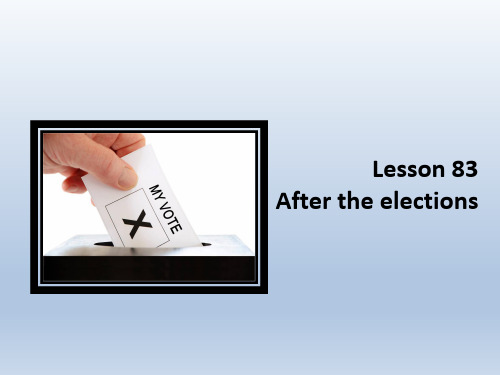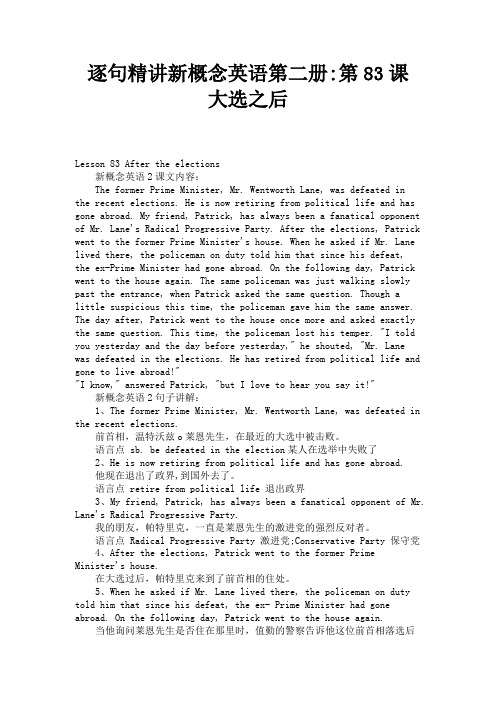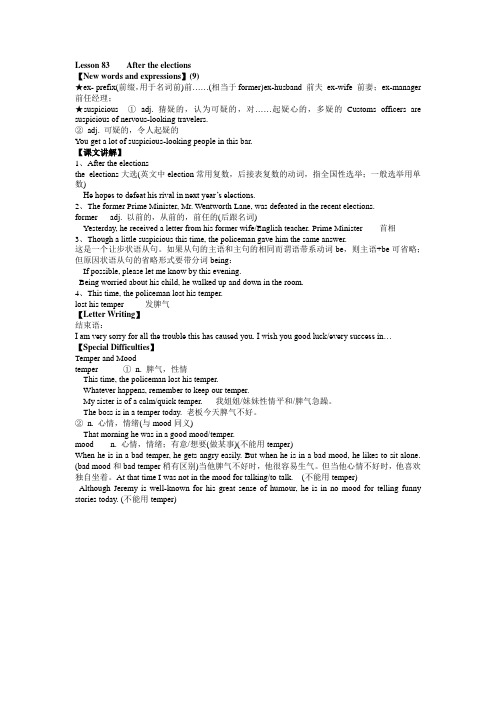新概念英语第二册笔记-第83课
新概念英语第二册第83课-After the elections

新概念英语第二册第83课:After theelectionsLesson 83 After the elections大选之后First listen and then answer the question.听录音,然后回答以下问题。
Why did Patrick keep on asking the same question?The former Prime Minister, Mr. Wentworth Lane, was defeated in the recent elections. He is now retiring from political life and has gone abroad. My friend, Patrick, has always been a fanatical opponent of Mr. Lane s Radical Progressive Party. After the elections, Patrick went to the former Prime Minister s house. When he asked if Mr. Lane lived there, the policeman on duty told him that since his defeat, the ex-Prime Minister had gone abroad. On the following day,Patrick went to the house again. The same policeman was just walking slowly past the entrance, whenPatrick asked the same question. Though a little suspicious this time, the policeman gave him the sameanswer. The day after, Patrick went to the house once more and asked exactly the same question. This time, the policeman lost his temper. I told you yesterday and the day before yesterday, he shouted, Mr. Lane was defeated in the elections. He has retired frompolitical life and gone to live abroad!I know, answered Patrick, but I love to hear you say it!参考译文前首相温特沃兹.莱恩先生在最近的大选中被击败。
新概念英语第二册Lesson 83 (共80张PPT)

Text
temper n. 心情,情绪
That morning she was in a
good mood / temper.
Text
mood n. 1ຫໍສະໝຸດ 心情,情绪;(与temper 同义) 2. 有意/想要(做某事)(不 能 用 temper)
Text
bad mood和bad temper 稍有区别:
Pattern Drill
T: stung – by a bee – a wasp S1: Is it true that he’s been stung by a bee? S2: Not quite. It was a wasp that stung him, not a bee.
Pattern Drill bitten – by a mosquito – an ant
Text
省略主、谓的 让步状语从句
Text
完整句子: Though the policeman was a little suspicious this time.
Text
The day after, Patrick went to the house once more and asked exactly the same question.
former adj.
the former world champion
New words and expressions
former adj.
the former president
New words and expressions
former adj.
the former boss the former colleague the former girlfriend the former wife
新概念第二册83

• Though a little suspicious this time, the policeman gave him the same answer. • though 引导的是让步状语从句 • 完整的从句是: • Though the policeman was a little suspicious this time……. • 如果从句的主语和主句的相同而谓语是系动词be,则 主语+be可省略,但原因状语从句的省略形式要带分词 being: • If possible, please let me know by this evening. • 如果可能的话,请今晚以前告诉我。 • Being worried about his child, he walked up and down in the room.
• • • • • • • •
同位语 同位语
• My friend, Patrick, has always been a fanatical opponent of Mr. Lane's Radical Progressive Party. • Radical Progressive Party. 激进党 • After the elections, Patrick went to the former Prime Minister's house.
• • • • • • • • • • • • • • •
progress (1) n. 前进、进行 (2) n. 进步、上进、发展 医学进展 the progress of medicine 你已经在说英语上取得了很大进展。 You’ve made great progress in speaking English . (3) n.经过、过程、进展 这个病人进步极为显著。 The patient is making remarkable progress. (4) v. 前进、进行、上进、提高 我们的工作現正稳步推进。 We are now progressing steadily with our work . 你在数学上进步很快 You’ve progressed quickly in mathematics .
新概念英语第二册逐句精讲语言点第83课(2)

新概念英语第二册逐句精讲语言点第83课(2)Lesson 83 After the elections 大选之后The former Prime Minister, Mr. Wentworth Lane, was defeated in the recent elections. He is now retiring from political life and has gone abroad. My friend, Patrick, has always been a fanatical opponent of Mr. Lane's Radical Progressive Party. After the elections, Patrick went to the former PrimeMinister's house. When he asked if Mr. Lane lived there, the policeman on duty told him that since his defeat, the ex-Prime Minister had gone abroad. On the following day, Patrick went to the house again. The same policeman was just walking slowly past the entrance, when Patrick asked the same question. Though a little suspicious this time, the policeman gave him the same answer. The day after, Patrick went to the house once more and asked exactly the same question. This time, the policeman lost his temper. "I told you yesterday and the day before yesterday," he shouted, "Mr. Lane was defeated in the elections. He has retired from political life and gone to live abroad!""I know," answered Patrick, "but I love to hear you say it!"句子讲解:5、When he asked if Mr. Lane lived there, the policeman on duty told him that since his defeat, the ex- Prime Minister had gone abroad. On the following day, Patrick went to the house again.当他询问莱恩先生是否住在那里时,值勤的警察告诉他这位前首相落选后出国去了。
新概念英语第二册83课

Listening and imitation
Intensive reading
Text
1. The former Prime Minister, Mr. Wentworth Lane, was defeated in the recent elections.
Explain: a. the former Prime Minister = the ex-Prime Minister 前首相 b. defeat sb 击败某人 = beat sb 打贏某人
defeat .
fanatical
(1)adj. 狂热的
(2)n.(主义、宗教等) 狂信者
fan n.(口) 迷、热心爱好者
a baseball fan
棒球迷
a rock and roll fan 摇滚迷
be crazy about …… 非常喜爱 ..., 醉心于
= be mad about …
Explain: go to 去……地方
5. When he asked if Mr. Lane lived there, the policeman on duty told him that since his defeat, the ex-Prime Minister had gone abroad.
• progressive [prə'gresɪv]• adj. 进步的
• suspicious [sə'spɪʃəs] • adj. 怀疑的
election n. (经由投票的) 选举; 当选
• a general election 大选,普选 • 举行选举
hold an election • 赢得选举,当选
新概念英语第二册笔记-第83课汇编

Lesson 83 After the elections大选之后【Text】The former Prime Minister, Mr. Wentworth Lane, was defeated in the recent elections. He is now retiring from political life and has gone abroad. My friend, Patrick, has always been a fanatical opponent of Mr. Lane's Radical Progressive Party. After the elections, Patrick went to the former Prime Minister's house. When he asked if Mr. Lane lived there, the policeman on duty told him that since his defeat, the ex-Prime Minister had gone abroad. On the following day, Patrick went to the house again. The same policeman was just walking slowly past the entrance, when Patrick asked the same question. Though a little suspicious this time, the policeman gave him the same answer. The day after, Patrick went to the house once more and asked exactly the same question. This time, the policeman lost his temper. 'I told you yesterday and the day before yesterday,' he shouted, 'Mr. Lane was defeated in the elections. He has retired from political life and gone to live abroad!" 'I know,' answered Patrick, 'but I love to hear you say it!'【课文翻译】前首相温特沃兹.莱恩先生在最近的大选中被击败。
新概念英语二册---Lesson 83

On the following day, Patrick went to the house again. The same policeman was just walking slowly past the entrance, when Patrick asked the same question.
❖ former: is used to describe someone who used to have a particular job,position,or role, but no longer has it. 前销售经理
former sales managers 前总理
former president 曾用名
② adj. 可疑的,令人起疑的
这场车祸看起来很可疑。
The car crash looks suspicious.
Revision
election [iˈlekʃən]
• n. 选举
former [ˈfɔ:mə]
• adj. 从前的
defeat
[diˈfi:t]
• v. 打败
fanatical [fəˈnætɪkəl]
a baseball fan
棒球迷
opponent
n. 反对者,对手
他以三比一击败对手。 He defeated his opponent by 3:1.
v. oppose
(1)v. 反对、抵抗
I oppose you going there alone .
我反对你独自去那里。
(2) v.使对立、使对抗
• adj. 狂热的
opponent [əˈpəunənt]
• n. 反对者,对手
新概念英语第二册第83课-After the elections

新概念英语第二册第83课:After the electionsLesson 83 After the elections大选之后First listen and then answer the question.听录音,然后回答以下问题。
Why did Patrick keep on asking the same question?The former Prime Minister, Mr. Wentworth Lane, was defeated in the recent elections. He is now retiring from political life and has gone abroad. My friend, Patrick, has always been a fanatical opponent of Mr. Lane's Radical Progressive Party. After the elections, Patrick went to the former Prime Minister's house. When he asked if Mr. Lane lived there, the policeman on duty told him that since his defeat, the ex-Prime Minister had gone abroad. On the following day, Patrick went to the house again. The same policeman was just walking slowly past the entrance, when Patrick asked the same question. Though a little suspicious this time, the policeman gave him the same answer. The day after, Patrick went to the house once more and asked exactly the same question. This time, the policeman lost his temper. 'I told you yesterday and the day before yesterday,' he shouted, 'Mr. Lane was defeated in the elections. He has retired from political life and gone to live abroad!"'I know,' answered Patrick, 'but I love to hear you say it!'参考译文前首相温特沃兹.莱恩先生在最近的大选中被击败。
新概念英语第二册Lesson83 After the elections

Lesson83 After the electionsEveryday EnglishBetter late than never. 迟做总比不做好。
Key Structures副词的用法(二)副词在句中的位置1)多数副词作状语时放在动词之后。
如果动词带有宾语,则放在宾语之后。
例如:Mr Smith works very hard.She speaks English well.2)频度副词作状语时,通常放在行为动词之前,情态动词,助动词和be动词之后。
例如:He usually gets up early.I’ve never heard him singing.She is seldom ill.3)程度副词一般放在所修饰的形容词和副词的前面,但enough作副词用时,通常放在被修饰词的后面。
例如:It is a rather difficult job.He runs very fast.He didn’t work hard enough.4)副词作定语时,一般放在被修饰的名词之后。
例如:On my way home,I met my uncle.The students there have a lot time to do their own research work.5)部分常用副词的用法(1) very,much这两个副词都可表示“很”,但用法不同。
Very用来修饰形容词和副词的原级,而much用来修饰形容词和副词的比较级。
例如:She is a very nice girlI’m feeling much better now.Much可以修饰动词,而very则不能。
例如:I don’t like the idea much.They did not talk much.(2)too,either这两个副词都表示“也”,但too用于肯定句,either用于否定句。
例如:She can dance,and I can dance,too.I haven’t read the book and my brother hasn’t either.(3)already,yetalready一般用于语肯定句,yet一般用于否定句。
《新概念英语》学什么:第2册第83课

《新概念英语》学什么:第2册第83课 《新概念英语》学什么:第2册82课接下去我们来看第83课的内容:一、小编的朗读二、重要句型或语法1、复习本课主要复习第74-82课的重要句型和语法内容,即:现在进行时、一般现在时、一般过去时、现在完成时、现在完成进行时、冠词、过去习惯的表达比较关系介词和被动语态等。
【推荐阅读】更多相关内容,请查看下面的文章:英语现在进行时的用法大全英语一般现在时的用法大全英语一般过去时的用法大全英语现在完成时的用法大全英语现在完成进行时的用法大全图解《新概念英语》语法之冠词used to 和be used to 的区别英语里的被动语态掌握这些内容就够了!三、课文主要语言点The former Prime Minister, Mr. Wentworth Lane, was defeated in te recent elections. He is now retiring from political life and has gone abroad. 1)former ,前任的。
2)PrimeMinister ,首相。
prime ,首要的、主要的;minister ,部长。
3)defeat ,击败、打败。
4)recent ,最近的。
5)election ,选举。
源自动词elect 。
6)retire from ,退出、退休。
7)political life ,政治生活、政界。
8)go abroad ,去国外。
My friend, Patrick, has always been a fanatical opponent of Mr. Lane's Radical Progressive Party. 1)has always been ,一直是。
2)fanatical ,狂热的。
3)opponent ,反对者。
源自动词oppose (反对),其形容词为opposite (相反的、相对的)。
新概念英语83课讲义

Lesson83 Going on holiday一、单词与短语mess:n.混乱,杂乱;关于mess常见的一个短语:in a mess:不整齐;在困境中;例:My desk is in a mess:我的书桌上乱七八糟;Let us go and help him, he is in a mess。
他在困境中,让我们去帮他吧。
Pack:v.包装、打包、装箱;例:We will go on holiday tomorrow and I am packing right now.明天就去度假了,我正在打包整理东西呢啊。
Suitcase:n.手提箱;leave:v.离开、动身;留下、剩下;关于leave的两个重要的短语:leave alone:让独自呆着,不管;leave behind:忘了带、、、遗留;例:leave us alone please:请不要管我们;I am sorry to let my books behind:糟糕,我忘记了带书。
already:adv.已经;already一般用于肯定句及疑问句中,是现在完成时的显著标志词。
例:Have you done it already?你已经做好了吗啊?Yes, I have done it already. 是的我已经做好了。
二、短语、句型及语法1、Do you want to have lunch with us?你想要跟我们一起吃饭吗?在本句中需要重点掌握:do you want to、、、句型。
这是英语中一个常见及应用甚广的句型:Do you want to play with us?你想要跟我们一起玩吗?Do you want to go with us?你想要跟我们一起去吗?2、Let′s go into the living room, carol.卡罗尔,我们到客厅里去吧。
在本句中需要重点掌握的一个知识点就是:let us 与Let′s两者在用法上的不同:Let′s虽然是let us 的缩写形式,但是两者用法具有本质的区别。
逐句精讲新概念英语第二册第83课 大选之后

逐句精讲新概念英语第二册:第83课大选之后Lesson 83 After the elections新概念英语2课文内容:The former Prime Minister, Mr. Wentworth Lane, was defeated inthe recent elections. He is now retiring from political life and has gone abroad. My friend, Patrick, has always been a fanatical opponent of Mr. Lane's Radical Progressive Party. After the elections, Patrick went to the former Prime Minister's house. When he asked if Mr. Lane lived there, the policeman on duty told him that since his defeat,the ex-Prime Minister had gone abroad. On the following day, Patrick went to the house again. The same policeman was just walking slowly past the entrance, when Patrick asked the same question. Though alittle suspicious this time, the policeman gave him the same answer. The day after, Patrick went to the house once more and asked exactly the same question. This time, the policeman lost his temper. "I told you yesterday and the day before yesterday," he shouted, "Mr. Lanewas defeated in the elections. He has retired from political life and gone to live abroad!""I know," answered Patrick, "but I love to hear you say it!"新概念英语2句子讲解:1、The former Prime Minister, Mr. Wentworth Lane, was defeated in the recent elections.前首相,温特沃兹o莱恩先生,在最近的大选中被击败。
新概念第二册lesson83

Lesson 83 After the elections【New words and expressions】(9)★ex- prefix(前缀,用于名词前)前……(相当于former)ex-husband 前夫ex-wife 前妻;ex-manager 前任经理;★suspicious ①adj. 猜疑的,认为可疑的,对……起疑心的,多疑的Customs officers are suspicious of nervous-looking travelers.②adj. 可疑的,令人起疑的Y ou get a lot of suspicious-looking people in this bar.【课文讲解】1、After the electionsthe elections大选(英文中election常用复数,后接表复数的动词,指全国性选举;一般选举用单数)He hopes to defeat his rival in next year’s elections.2、The former Prime Minister, Mr. Wentworth Lane, was defeated in the recent elections.former adj. 以前的,从前的,前任的(后跟名词)Yesterday, he received a letter from his former wife/English teacher. Prime Minister 首相3、Though a little suspicious this time, the policeman gave him the same answer.这是一个让步状语从句。
如果从句的主语和主句的相同而谓语带系动词be,则主语+be可省略;但原因状语从句的省略形式要带分词being:If possible, please let me know by this evening.Being worried about his child, he walked up and down in the room.4、This time, the policeman lost his temper.lost his temper 发脾气【Letter Writing】结束语:I am very sorry for all the trouble this has caused you. I wish you good luck/every success in…【Special Difficulties】Temper and Moodtemper ①n. 脾气,性情This time, the policeman lost his temper.Whatever happens, remember to keep our temper.My sister is of a calm/quick temper. 我姐姐/妹妹性情平和/脾气急躁。
新概念英语第二册(英音新版) 第83课:大选之后

新概念英语第二册(英音新版) 第83课:大选之后 Lesson 83 After the elections第八十三课大选之后First listen and then answer the question.听录音,然后回答以下问题。
Why did Patrick keep on asking the same question?为什么帕特里克继续问同样的问题?The former Prime Minister, Mr. Wentworth Lane, was defeated in the recent elections.前首相温特沃兹.莱恩先生在最近的大选中被击败。
He is now retiring from political life and has gone abroad.他现在退出了政界,到国外去了。
My friend, Patrick, has always been a fanatical opponent of Mr. Lane's Radical Progressive Party.我的朋友帕特里克一直是莱恩先生的激进党的强烈反对者。
After the elections, Patrick went to the former Prime Minister's house.大选结束后,帕特里克来到了前首相的住处。
When he asked if Mr. Lane lived there, the policeman on duty told him that since his defeat, the ex-Prime Minister had gone abroad.当他询问莱恩先生是否住在那里时,值班的警察告诉他这位前首相落选后出国去了。
On the following day, Patrick went to the house again.第二天,帕特里克再次来到首相的住处。
- 1、下载文档前请自行甄别文档内容的完整性,平台不提供额外的编辑、内容补充、找答案等附加服务。
- 2、"仅部分预览"的文档,不可在线预览部分如存在完整性等问题,可反馈申请退款(可完整预览的文档不适用该条件!)。
- 3、如文档侵犯您的权益,请联系客服反馈,我们会尽快为您处理(人工客服工作时间:9:00-18:30)。
1 / 13 Lesson 83 After the elections大选之后 【Text】 The former Prime Minister, Mr. Wentworth Lane, was defeated in the recent elections. He is now retiring from political life and has gone abroad. My friend, Patrick, has always been a fanatical opponent of Mr. Lane's Radical Progressive Party. After the elections, Patrick went to the former Prime Minister's house. When he asked if Mr. Lane lived there, the policeman on duty told him that since his defeat, the ex-Prime Minister had gone abroad. On the following day, Patrick went to the house again. The same policeman was just walking slowly past the entrance, when Patrick asked the same question. Though a little suspicious this time, the policeman gave him the same answer. The day after, Patrick went to the house once more and asked exactly the same question. This time, the policeman lost his temper. 'I told you yesterday and the day before yesterday,' he shouted, 'Mr. Lane was defeated in the elections. He has retired from political life and gone to live abroad!" 'I know,' answered Patrick, 'but I love to hear you say it!' 【课文翻译】 前首相温特沃兹.莱恩先生在最近的大选中被击败。他现在退出了政界,到国外去了。我的朋友帕特里克一直
是莱恩先生的激进党的强烈反对者。大选结束后,帕特里克来到了前首相的住处。当他询问莱恩先生是否住在那里时,值班的警察告诉他这位前 首相落选后出国去了。第二天,帕特里克再次来到首相的住处。昨天的那位警察正从门口慢慢走过,帕特里克上前问了和昨天同样的问题。虽然那位警察这次有点疑心,但还是对他作了同样的回答。第三天,帕特里克又去了,提出了同前两天完全一 样的问题。这一次警察火了。“我昨天和前天都告诉过您了,”他大叫着,“莱恩先生在大选中被击败了,他已经退出了政界去国外了!”“这我都知道,”帕特里克说,“可我就是喜欢听你说出这些!”
New words and expressions 生词和短语
election n. 选举 former adj. 从前的 defeat v. 打败 fanatical adj. 狂热的 opponent n. 反对者,对手 radical adj. 激进的 progressive adj. 进步的 ex- prefix(前缀,用于名词前)前…… suspicious adj. 怀疑的 2 / 13
【生词讲解】 1. election n. 选举 1) election 指一般选举时用单数,指全国性的选举时用复数: eg:An election will be held next month. 下月将举行一次选举。 eg:In America,presidential elections are held every four years. 美国总统选举每四年一次 eg:He hopes to defeat his rival in next year's elections. 他希望在明年的大选中击败对手。 eg:He is standing for election. 他是候选人。 elective subjects选修科目 a general election 大选 an election campaign 竞选活动 Election day 选挙日、投票日 2) elect v. 选举(某人) eg:He was elected to the Senate (参议院) in the last election. 在上次的选举,他当选为参议员。 eg:We’d like to elect a chairperson now. 我们想现在选出一名主席。 eg:They elect him as mayor. 他们选他当市长 3) elect + sb + to …..选举(某人)担任(某职) eg:We elect her to the Board of Education. 我们选她加入教育委员会。 4) elector n. 选举人、合格选民
2. former 1) adj. 从前的、以前的 my former English teacher我以前的英语老师 in former time = in former days 以前、往昔 3 / 13
the former world champion前世界冠军 eg:Yesterday, he received a letter from his former wife/English teacher. 昨天他收到了他前妻/以前的英语老师的一封信。 2)(前述两者中的)前者的、前面的 the former 前者 ←→ the latter 后者 eg:I prefer the former design to the latter . 我比较喜欢前者的设计方案,不喜欢后者 eg:Kate and Jane are sisters. The former is a pianist ;the latter is a singer . 凯特和简是姐妹。前者是一个钢琴家,后者是一名歌手 formerly adv. 以前、原本 nowadays 现今,现在 eg:Formerly this neighborhood was a poor village . 以前这附近是一个贫穷的村庄
3. defeat 1) v. 打败 defeat an enemy 打败敌人, 战胜敌人 eg:Our team defeated our opponent by 5:0. 我队以5比零击败对手。 eg:The enemy was defeated in a decisive battle. 敌人在一场决定性的战斗中被击败。 2) n 挫折、失败 eg:Our baseball team has suffered another defeat. 我们的棒球队再遭失败 admit defeat 认输 a decisive defeat 一个决定性的失败 a crushing defeat 彻底失败 = a total defeat = an utter defeat 3) v.困惑,难倒 eg:I've tried to solve the problem, but it defeats me. 我想解决这个问题,但是把我难倒了 * crush [krʌʃ] vt. 压碎,弄皱;镇压,制服,压垮 4 / 13
* utter [ˈʌtə] vt. 发出(声音),说 a.完全的,绝对的
4. fanatical = fanatic 1)adj. 狂热的 fanatical about sth. eg:She's fanatical about keeping fit. 她如痴如醉的注重健美 fanatic狂热者 2)n.(主义、宗教等) 狂信者 fan n.(口) 迷、热心爱好者 a baseball fan 棒球迷 ; a rock'n'roll fan 摇滚迷 be crazy about ……非常喜爱 ..., 醉心于 = be mad about … fan letter 影迷或球迷写的崇拜信
5. opponent n. 反对者,对手 eg:He beat his opponent by three sets to one. 他以三比一击败对手。 beat an opponent at an election 选举时击败了对手 eg:Her opponet left the tennis court in tears. 她的对手含泪离开了网球场。 opponent of sth.反对者 an opponent of nuclear weapons反对核武器的人 oppose v. 1) 反对、抵抗 eg:I oppose your going there alone. 我反对你去那里 eg:The storm opposed our advance. 暴风雨阻止我们前进 2)使对立、使对抗 oppose + sth + to = oppose + sth + against 对立、对抗
